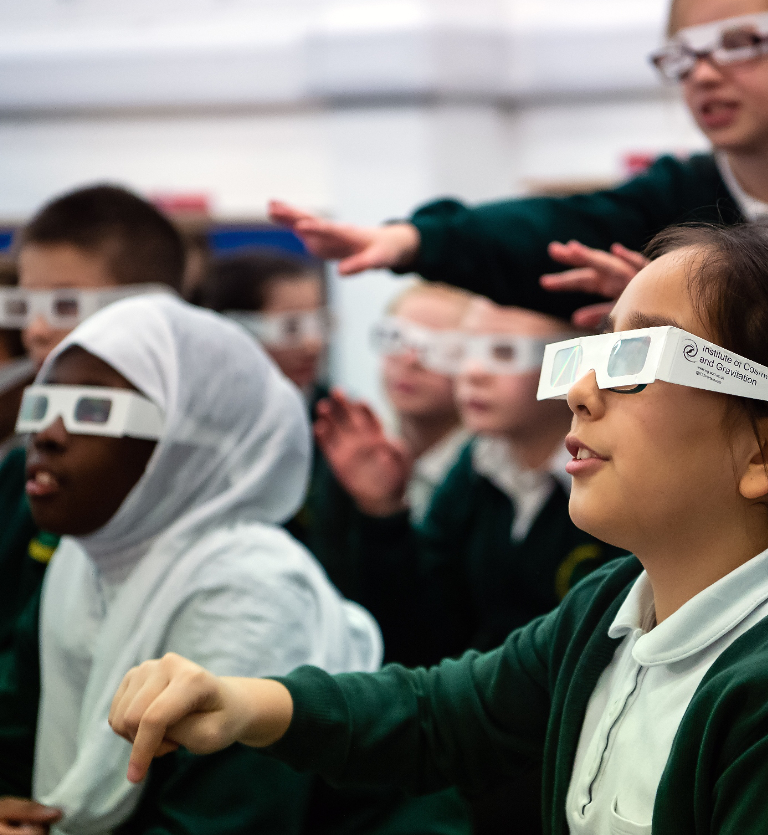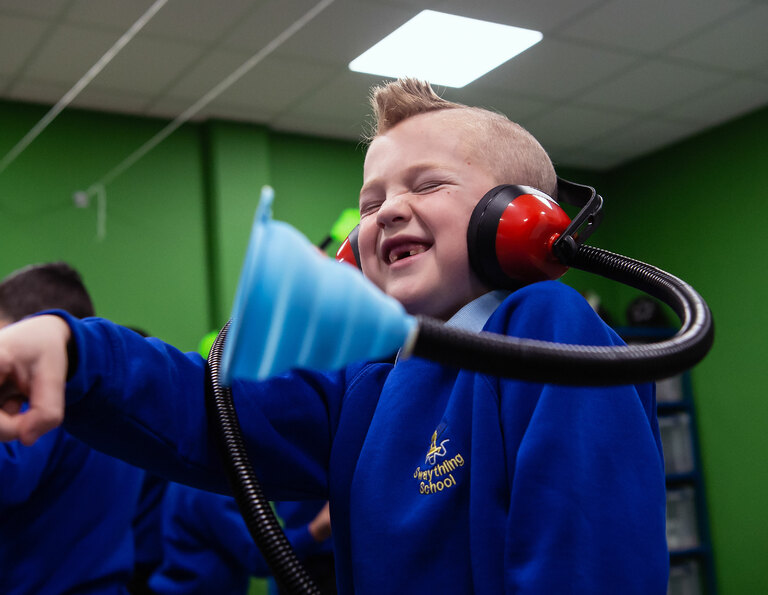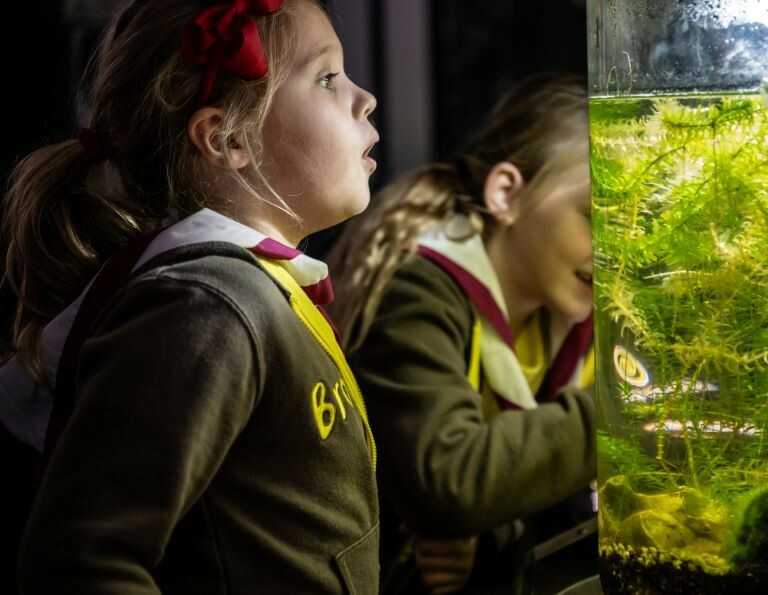Are you ready for the ultimate educational visit?
As well as a bespoke Planetarium show and exploration time with the hands-on science exhibits, you can choose from one of six curriculum-linked Discovery workshops. Here's an overview of our science workshop for schools and some handy information for your risk assessment.
Marvellous Minibeasts (KS1, KS2)
Come and explore the weird and wonderful world of British bugs. Get up close to live minibeasts. Examine lifecycles, diets and behaviour. And discover the hidden secrets of the flora and fauna of the South Downs National Park.
Did you know that Winchester Science Centre is located in the stunning South Downs National Park? There’s so much wildlife around us – let’s explore some of it together in the Marvellous Minibeasts workshop.
In our Bio:Space zone we’ve got real British bugs for your pupils to come and meet. We’ll examine their lifecycles, diets and behaviours and even step into the roles of different insects to explore how they see the world. Then grab a magnifying glass and microscope to investigate the hidden structures of the South Downs flora and fauna. What will we discover?
Star Seekers (KS1, KS2, Yr 7)
Let's discover starlight secrets on this epic astronomical adventure. Young astro-engineers will experiment to see how to direct and deflect light in space. Wow!
Have you heard all about the James Webb Telescope? In Star Seekers you'll get an introduction to this amazing piece of space technology. Let's also explore the properties of light. We'll start with the visible spectrum before moving to infrared and heat exchange. And what happens if we use diffraction to break light into its constituent parts? Let's find out!
Notes for your risk assessments for Star Seekers:
- Electrical lamps will be used. These are PAT tested regularly at the Science Centre.
- Infrared lamps can get hot. A warning is given about this during the workshop. Long, direct viewing of the bulbs can also cause damage to eyes. Students are supervised at all times during the experiment. It is set up to ensure they do not look directly into the lamp for prolonged periods.
- Laser mases will be used. These are very low grade lasers. They are not harmful even if used for a prolonged period.
- Laser thermometers will be used. Students are given clear instructions on how to use these properly. They are supervised at all times when using a thermometer.
- There is limited evidence to suggest that diffraction glasses can, in rare cases, cause seizures in epilepsy sufferers.
Solid. Liquid. Squish! (KS1, KS2, Yr 7)
Let's investigate matter – especially a weird 'matter in the middle'. It's a sticky sensory workshop. We'll make slime and make it stretch, twist and bounce.
What's the difference between solids, liquids and gases? Let's find out together. Explore why they behave the way they do. Then let's make some slime! As a non-Newtonian fluid, slime brings the properties of matter to life. See and feel them in action while having a lot of fun.
Notes for your risk assessment for Solid.Liquid.Squish!:
- Children may be asked to move around in a manner that represents solids, liquids or gases. They are told not to run.
- Slime Ingredients: Cornflour, water, Xanthan Gum. These ingredients are of food grade standard so they can be ingested, although it is not recommended. Please be aware if any children have allergies or sensitivities to handling any of these ingredients.
- Allergerns to note: Gluten, Soya, Sulphur, Milk, Nuts, Peanuts, Celery, Mustard and Sesame.
- All children need to wash their hands after handling the slime. Hand sanitizer is available. Groups will be also shown the location of the toilets when arriving.
- All spillages, which are unlikely, are cleaned up immediately.
Blast Off! (KS1, KS2, Yr 7)
Our rocket workshop is for budding engineers to learn about forces. Build, test and make your rockets amazing. Let's power them with fuel and fire and launch them too!
Three, two, one! Let's launch our very own rockets. Let's learn about forces and combustion. We'll do an awesome whoosh bottle experiment. Then you'll design your very own rockets using foam pieces and K'nex. Maximise their flying potential. Consider what will make them aerodynamic. Then let the countdown begin!
Notes for your risk assessment for Blast Off!:
- Methylated spirits will be used to fire the rockets by our highly trained presenters. This is a flammable material and a vapour. Only small amounts are used. It burns out quickly. The vapour can be known to make people drowsy. You must wash hands immediately if any is spilt on your skin. Fire extinguishers are nearby and our presenters are highly trained. First aiders are onsite with access to burns kits if needed.
- Ear defenders are available for the whoosh bottle experiment. It is not particularly loud.
- Neodymium magnets will be used. Please let us know of any pacemakers or cochlear implants in your group.
- K’nex pieces will be used. These can be a potential choking hazard.
Soundscape Studio (KS1, KS2, Yr 7)
This is a loud, interactive workshop to explore how we hear sound and process it. Experiment with weird and wonderful gadgets. Reinvent yourself with differently positioned ears!
We love sound at Winchester Science Centre! Will you explore sound and frequency with us? Discover how sound travels. Explore what volume and pitch are. We'll even test our own hearing and compare our ears to creatures in the animal world.
Notes for your risk assessment for Soundscape Studio:
- There will be noise and vibration.
- A blow torch will be used. Only our highly trained presenter will use this.
- There will be loud sounds of high and low frequency.
The Science of Me (KS1, KS2, Yr 7)
Let's find out how we work by learning more about the human body. Investigate how the systems in our body work and find out how we can keep them healthy. Discover the secrets of our heart by exploring the structure of a real sheep heart.
Explore the human body, focusing on two of the most important organs: the heart and lungs! Learn how blood moves around the body. Explore the heart in more detail as students have the opportunity to handle a real-life specimen. Together we'll explore how our body functions and what we can do to keep them happy and healthy.
Notes for your risk assessment for The Science of Me:
- Students get to handle a real-life sheep heart specimen in this workshop. Please contact our education team at education@winchestersciencecentre.org if you have any questions.
- To handle the heart specimens, we have non-latex gloves for the students. If there are any latex allergies, please let us know.
- There will be low levels of physical activity.
Habitat Heroes (KS1,2 and Year 7)
This is your chance to get a closer look at the wonderful wildlife living in the South Downs. It’s time to get hands-on as you explore nature’s habitats and learn how different species survive and thrive in their environment.
Located in the beautiful backdrop of the South Downs, Winchester Science Centre is surrounded by lots of different types of wildlife. Together, in our Habitat Heroes workshop, we are going to explore how the habitats around us can support such a wide range of life.
Join us as we venture out into the South Downs and step into the role of different animals, discovering how they interact with and depend on the habitats around them. We’ll then team up to create our own wild spaces to support our local ecosystems and become true Habitat Heroes.
Notes for your Risk Assessments for Habitat Heroes:
- A large part of this workshop will take place outside, so we will subject to the elements. Ensure that all students have weather appropriate clothing.
- Being outside comes with a few additional risks, such as uneven ground, stinging plants, and insects. Before heading out, the lead presenter will deliver a safety briefing to explain how to move around the space safely.






